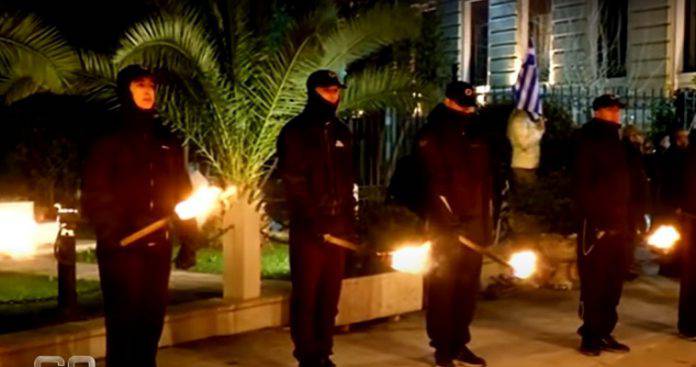Stavros Lygeros: “Anti-systemic” paramilitary violence and systemic political expediencies
13/10/2020
It was inevitable that at some point it was bound to happen. On September 18, 2013, during a clash in Keratsini, Golden Dawn member Giorgos Roupakias stabbed and killed the anti-fascist rapper Pavlos Fyssas. The assassination intensified the challenge that Golden Dawn represented for the coordinated State. The neo-Nazi organization was not limited to incendiary rhetoric. It differed because the culture of paramilitary violence is an organic component of its ideology and practice.
When a party cultivates this culture, when it gives it ideological and political characteristics, when it systematically disseminates it to its members and followers, especially to the youth, then it leads with mathematical precision to events like that of Keratsini. Even if it was not organized murder, at some point one of its members would take the above step and the usual beatings would turn into murder.
The fact that before the assassination of Fyssas some people were flirting with the idea of outlawing Golden Dawn showed that at that time some saw only the repressive and not the political side of the problem. Banning a party, something which is not legally provided for, is practically ineffective, as it can be re-established under another name. At the political level, in fact, historical experience teaches that it usually brings the opposite of the expected results, because it creates a climate of victimization and brings together particularly angry voters.
At this point, it is worth noting that the motivations of older people who had voted for Golden Dawn were more linked to illegal immigration and the economic crisis. It was therefore largely conjectural. The motives of the young people who enlisted in the neo-Nazi party, however, usually had an ideological content, even if grossly misguided. An extreme right-wing current had begun to form in the youth – and not just.
The murder of Fyssas was a milestone
Prior to the murder, Golden Dawn officials had often, in front of the cameras, committed criminally heinous arbitrariness, without suffering consequences, while they should have been prosecuted immediately for any illegality, even the smallest one. The tolerance shown for a long time by the coordinated State was due to the fact that there were unacknowledged expediencies both at the level of the major parties and more broadly within the ruling elites.
How else can one explain that it took the murder of Fyssa to gather all the dozens of stagnant cases that concerned criminal offenses of Golden Dawn? In a rule of law, the democratic and effective way would be to systematically control and severely punish any illegal activity. Otherwise, neo-Nazi ideas are fought with ideas and not one-dimensionally with repression.
Although the culture of paramilitary violence is an organic component of its ideology and practice, Golden Dawn was not a typical criminal organization, e.g. the Mafia. It had such a dimension, but at the same time, it had the dimension of a neo-Nazi movement, which had begun to gain a social foothold.
That is why neither the rhetorical complaints nor the repressive measures alone were enough to stop the electoral current in its favor. Prosecution required ideological-political deconstruction, although as a rule the leaders of the neo-Nazi organization were lumpen elements. I had supported these ideas since 2010-11, when some systemic circles still saw Golden Dawn as a potentially useful political tool.
The theory of two extremes
We recall the theory of the two extremes professed by the then leadership of the New Democracy party which were supposed to be ready to throw Greece into a civil war. This theory presupposed the existence of the Golden Dawn, since it showed SYRIZA as the other extreme, which was supposedly guiding anti-authoritarians as well.
It was a tactic that fostered a climate of national division and undermined democracy because it arbitrarily turned political differences into regime-based conflicts. In that highly flammable economic and social environment, the two-pronged strategy was essentially fueling the fire and was therefore opportunistic.
This, perhaps, explains why until the assassination of Fyssas the political and media system was clearly tolerating neo-Nazi illegal activities. It also explains why the system closed its eyes to what started to come out after the murder. Fyssas’ murder was the turning point, the act that destroyed all the games and marked the beginning of the end, even if it was not immediately apparent.
If the assassination of Fyssas took place in the context of frequent clashes between Golden Dawn and leftists, it would give substance to the theory of the two extremes and would sow the fear of civil war with whatever this would mean politically-electorally. It was, however, a criminal act with clear roles for the perpetrator and the victim.
The shock to public opinion forced the then government to turn around and declare war on Golden Dawn in the name of defending democracy. In this respect, the blood of Pavlos Fyssas was not wasted. That is why the assassination of two members of Golden Dawn by a terrorist organization with far-left rhetoric a few weeks later did not spark a vendetta and bloodshed, although it was a political-communication gift for Michaloliakos’s party.





